Abstract
The radiation response of Epstein-Barr virus (EBV)-immortalised lymphoblastoid cell lines derive from Li-Fraumeni syndrome (LFS) and LFS-like individuals was investigated. Cells from all LFS and LFS-like cases showed an accumulation of p53 protein following 137Cs gamma-irradiation, which was associated with cell cycle arrest at the G1/S border. This response was indistinguishable from that seen in cells derived from normal individuals, and occurred in cases with missense mutations in the TP53 gene at codons 175, 180, 220 and 248 and also in two LFS-like individuals with no TP53 mutation. Previous studies using lymphocytes and fibroblasts from LFS individuals have demonstrated abnormal radiation responses in these cells. This suggest cell type specificity in the contribution of a mutant p53 protein to phenotype.
Full text
PDF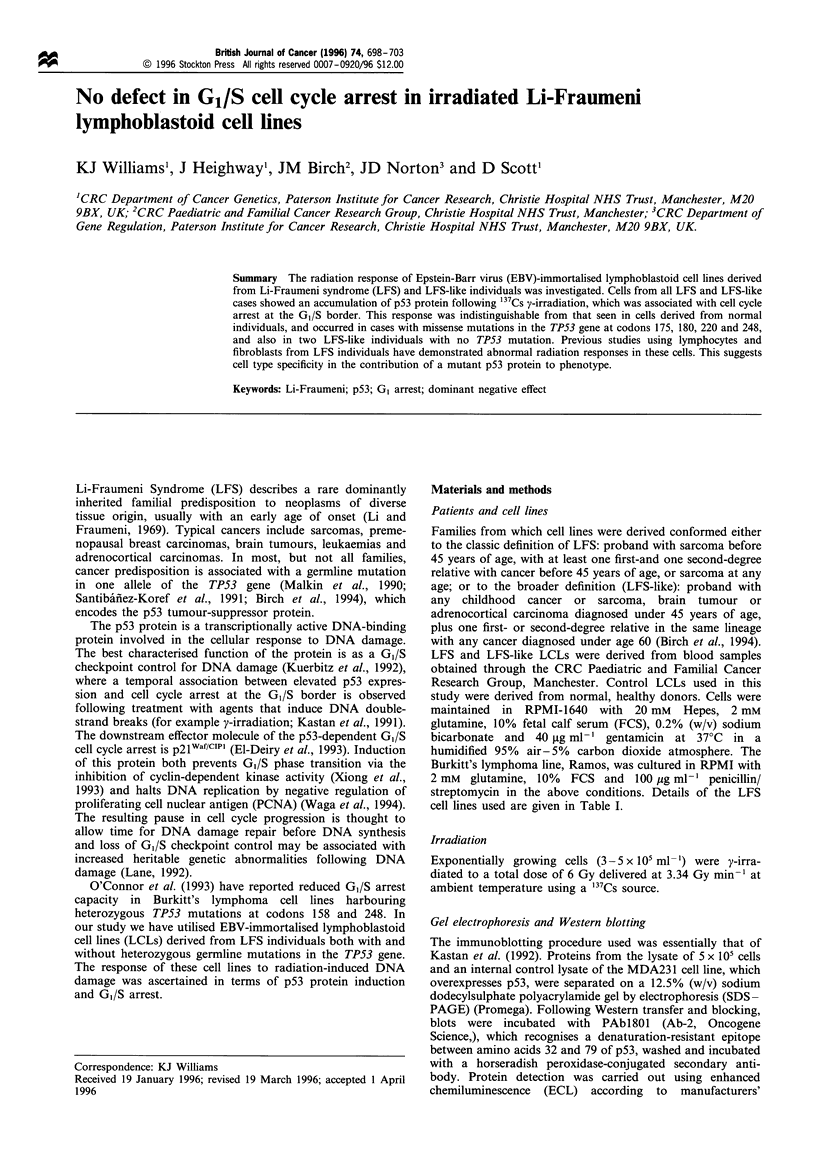
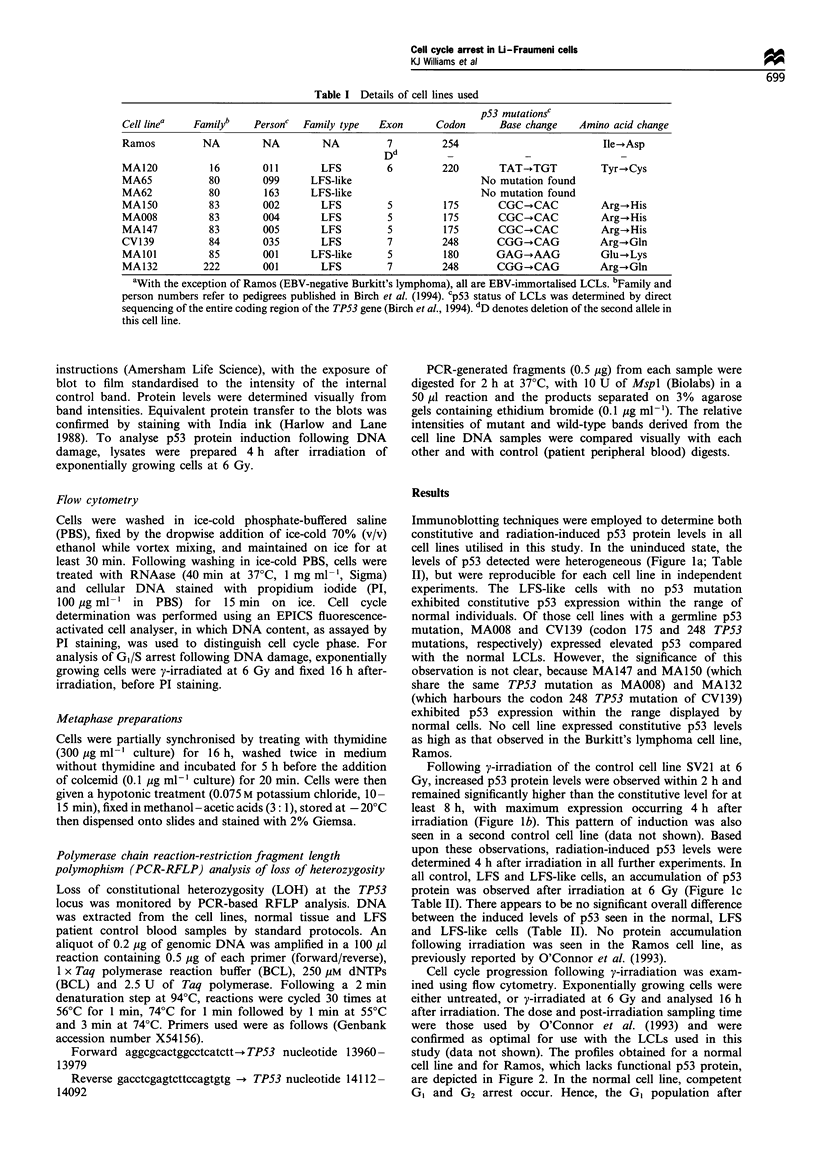
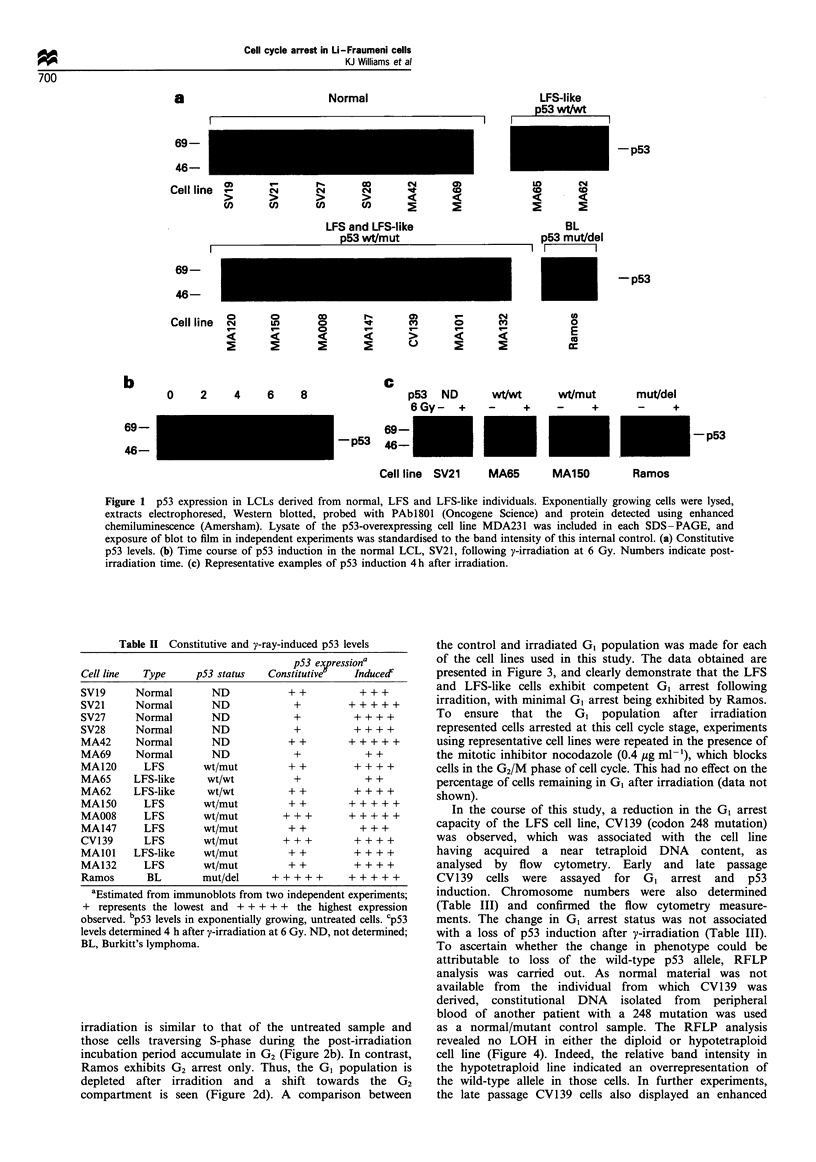
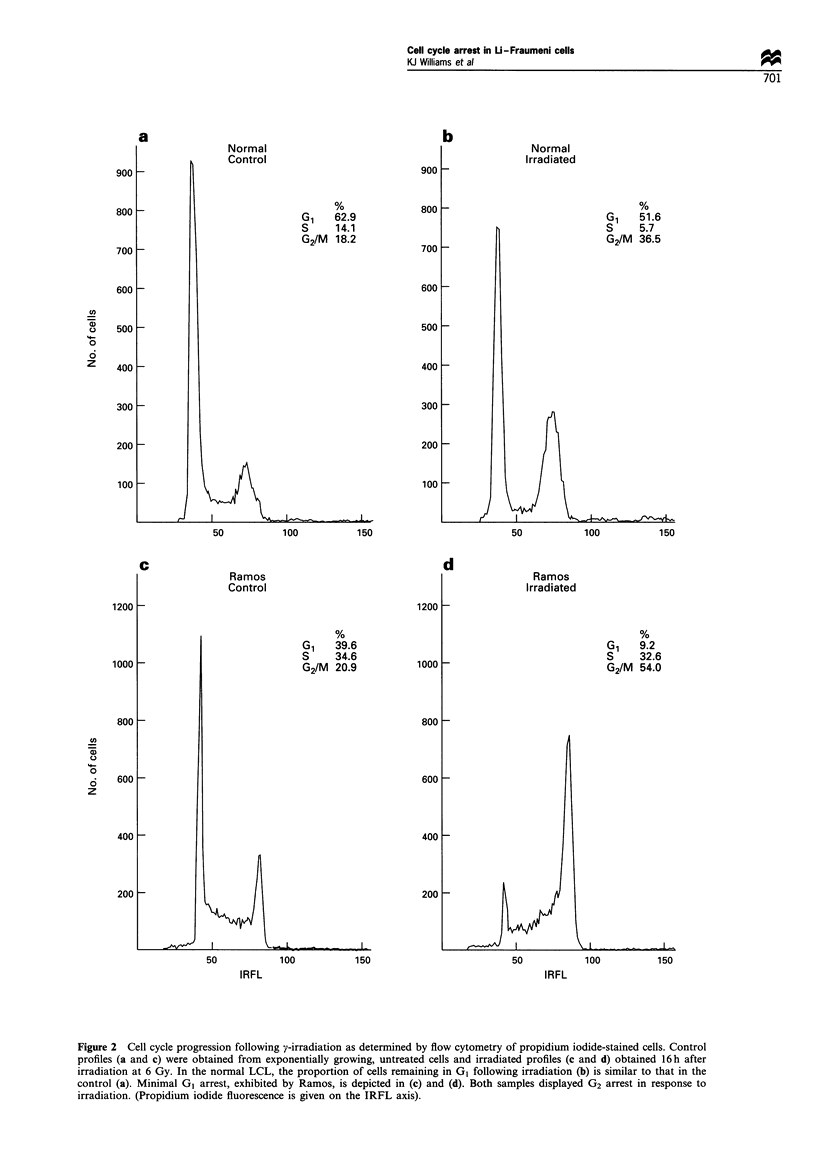
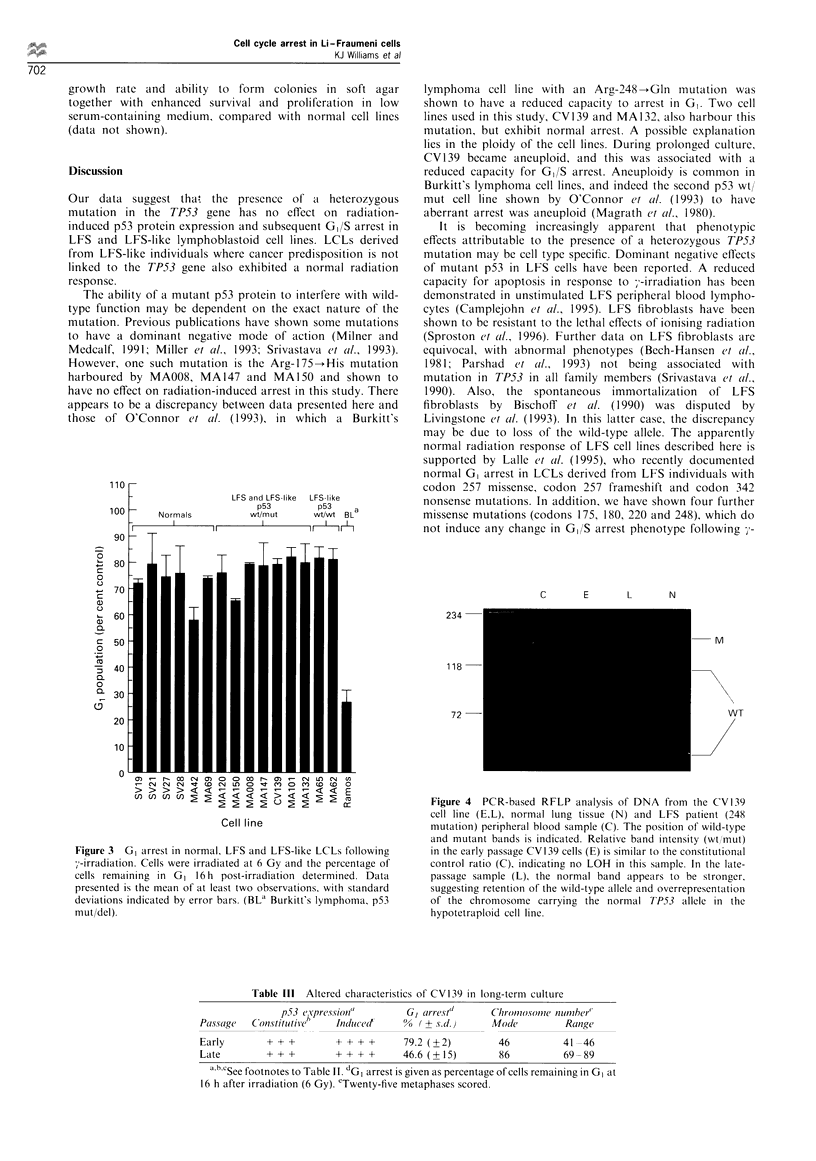
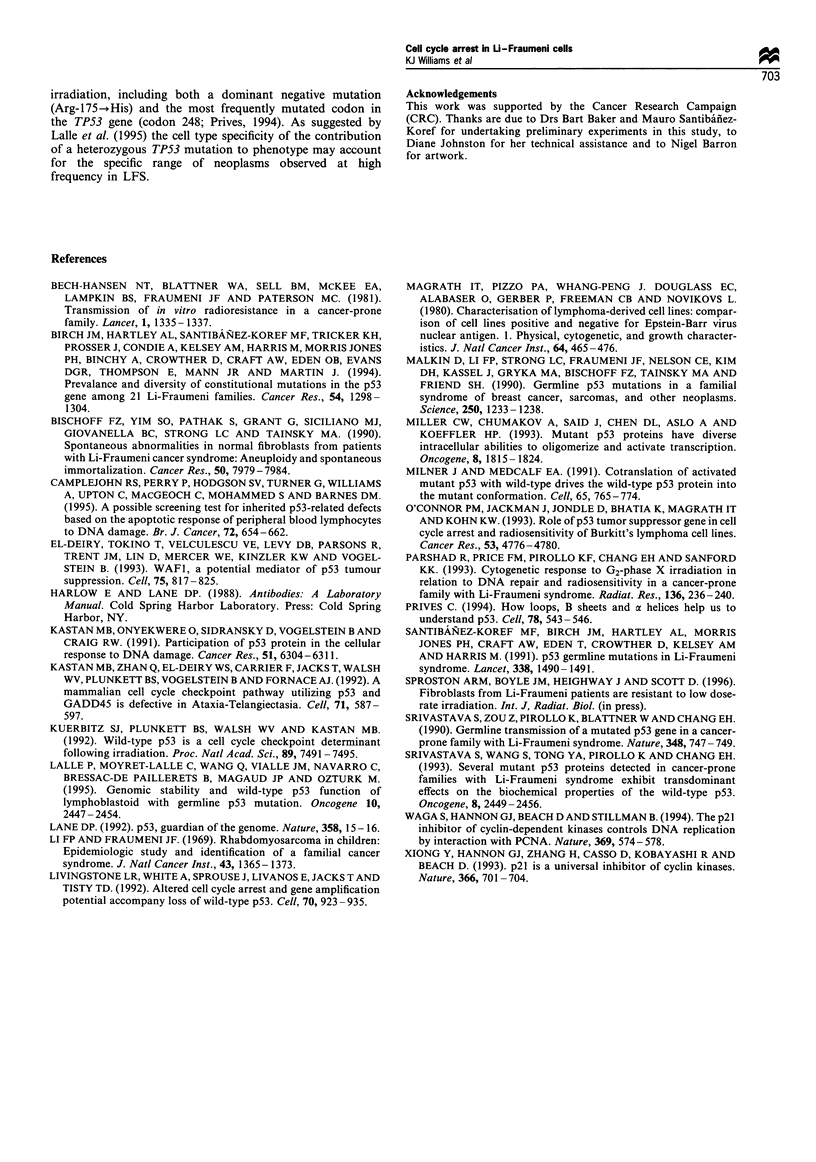
Images in this article
Selected References
These references are in PubMed. This may not be the complete list of references from this article.
- Bech-Hansen N. T., Blattner W. A., Sell B. M., McKeen E. A., Lampkin B. C., Fraumeni J. F., Jr, Paterson M. C. Transmission of in-vitro radioresistance in a cancer-prone family. Lancet. 1981 Jun 20;1(8234):1335–1337. doi: 10.1016/s0140-6736(81)92517-4. [DOI] [PubMed] [Google Scholar]
- Birch J. M., Hartley A. L., Tricker K. J., Prosser J., Condie A., Kelsey A. M., Harris M., Jones P. H., Binchy A., Crowther D. Prevalence and diversity of constitutional mutations in the p53 gene among 21 Li-Fraumeni families. Cancer Res. 1994 Mar 1;54(5):1298–1304. [PubMed] [Google Scholar]
- Bischoff F. Z., Yim S. O., Pathak S., Grant G., Siciliano M. J., Giovanella B. C., Strong L. C., Tainsky M. A. Spontaneous abnormalities in normal fibroblasts from patients with Li-Fraumeni cancer syndrome: aneuploidy and immortalization. Cancer Res. 1990 Dec 15;50(24):7979–7984. [PubMed] [Google Scholar]
- Camplejohn R. S., Perry P., Hodgson S. V., Turner G., Williams A., Upton C., MacGeoch C., Mohammed S., Barnes D. M. A possible screening test for inherited p53-related defects based on the apoptotic response of peripheral blood lymphocytes to DNA damage. Br J Cancer. 1995 Sep;72(3):654–662. doi: 10.1038/bjc.1995.390. [DOI] [PMC free article] [PubMed] [Google Scholar]
- Kastan M. B., Onyekwere O., Sidransky D., Vogelstein B., Craig R. W. Participation of p53 protein in the cellular response to DNA damage. Cancer Res. 1991 Dec 1;51(23 Pt 1):6304–6311. [PubMed] [Google Scholar]
- Kastan M. B., Zhan Q., el-Deiry W. S., Carrier F., Jacks T., Walsh W. V., Plunkett B. S., Vogelstein B., Fornace A. J., Jr A mammalian cell cycle checkpoint pathway utilizing p53 and GADD45 is defective in ataxia-telangiectasia. Cell. 1992 Nov 13;71(4):587–597. doi: 10.1016/0092-8674(92)90593-2. [DOI] [PubMed] [Google Scholar]
- Kuerbitz S. J., Plunkett B. S., Walsh W. V., Kastan M. B. Wild-type p53 is a cell cycle checkpoint determinant following irradiation. Proc Natl Acad Sci U S A. 1992 Aug 15;89(16):7491–7495. doi: 10.1073/pnas.89.16.7491. [DOI] [PMC free article] [PubMed] [Google Scholar]
- Lalle P., Moyret-Lalle C., Wang Q., Vialle J. M., Navarro C., Bressac-de Paillerets B., Magaud J. P., Ozturk M. Genomic stability and wild-type p53 function of lymphoblastoid cells with germ-line p53 mutation. Oncogene. 1995 Jun 15;10(12):2447–2454. [PubMed] [Google Scholar]
- Li F. P., Fraumeni J. F., Jr Rhabdomyosarcoma in children: epidemiologic study and identification of a familial cancer syndrome. J Natl Cancer Inst. 1969 Dec;43(6):1365–1373. [PubMed] [Google Scholar]
- Livingstone L. R., White A., Sprouse J., Livanos E., Jacks T., Tlsty T. D. Altered cell cycle arrest and gene amplification potential accompany loss of wild-type p53. Cell. 1992 Sep 18;70(6):923–935. doi: 10.1016/0092-8674(92)90243-6. [DOI] [PubMed] [Google Scholar]
- Magrath I. T., Pizzo P. A., Whang-Peng J., Douglass E. C., Alabaster O., Gerber P., Freeman C. B., Novikovs L. Characterization of lymphoma-derived cell lines: comparison of cell lines positive and negative for Epstein-Barr virus nuclear antigen. I. Physical, cytogenetic, and growth characteristics. J Natl Cancer Inst. 1980 Mar;64(3):465–476. [PubMed] [Google Scholar]
- Malkin D., Li F. P., Strong L. C., Fraumeni J. F., Jr, Nelson C. E., Kim D. H., Kassel J., Gryka M. A., Bischoff F. Z., Tainsky M. A. Germ line p53 mutations in a familial syndrome of breast cancer, sarcomas, and other neoplasms. Science. 1990 Nov 30;250(4985):1233–1238. doi: 10.1126/science.1978757. [DOI] [PubMed] [Google Scholar]
- Miller C. W., Chumakov A., Said J., Chen D. L., Aslo A., Koeffler H. P. Mutant p53 proteins have diverse intracellular abilities to oligomerize and activate transcription. Oncogene. 1993 Jul;8(7):1815–1824. [PubMed] [Google Scholar]
- Milner J., Medcalf E. A. Cotranslation of activated mutant p53 with wild type drives the wild-type p53 protein into the mutant conformation. Cell. 1991 May 31;65(5):765–774. doi: 10.1016/0092-8674(91)90384-b. [DOI] [PubMed] [Google Scholar]
- O'Connor P. M., Jackman J., Jondle D., Bhatia K., Magrath I., Kohn K. W. Role of the p53 tumor suppressor gene in cell cycle arrest and radiosensitivity of Burkitt's lymphoma cell lines. Cancer Res. 1993 Oct 15;53(20):4776–4780. [PubMed] [Google Scholar]
- Parshad R., Price F. M., Pirollo K. F., Chang E. H., Sanford K. K. Cytogenetic response to G2-phase X irradiation in relation to DNA repair and radiosensitivity in a cancer-prone family with Li-Fraumeni syndrome. Radiat Res. 1993 Nov;136(2):236–240. [PubMed] [Google Scholar]
- Prives C. How loops, beta sheets, and alpha helices help us to understand p53. Cell. 1994 Aug 26;78(4):543–546. doi: 10.1016/0092-8674(94)90519-3. [DOI] [PubMed] [Google Scholar]
- Santibáez-Koref M. F., Birch J. M., Hartley A. L., Jones P. H., Craft A. W., Eden T., Crowther D., Kelsey A. M., Harris M. p53 germline mutations in Li-Fraumeni syndrome. Lancet. 1991 Dec 14;338(8781):1490–1491. doi: 10.1016/0140-6736(91)92303-j. [DOI] [PubMed] [Google Scholar]
- Srivastava S., Wang S., Tong Y. A., Pirollo K., Chang E. H. Several mutant p53 proteins detected in cancer-prone families with Li-Fraumeni syndrome exhibit transdominant effects on the biochemical properties of the wild-type p53. Oncogene. 1993 Sep;8(9):2449–2456. [PubMed] [Google Scholar]
- Srivastava S., Zou Z. Q., Pirollo K., Blattner W., Chang E. H. Germ-line transmission of a mutated p53 gene in a cancer-prone family with Li-Fraumeni syndrome. Nature. 1990 Dec 20;348(6303):747–749. doi: 10.1038/348747a0. [DOI] [PubMed] [Google Scholar]
- Waga S., Hannon G. J., Beach D., Stillman B. The p21 inhibitor of cyclin-dependent kinases controls DNA replication by interaction with PCNA. Nature. 1994 Jun 16;369(6481):574–578. doi: 10.1038/369574a0. [DOI] [PubMed] [Google Scholar]
- Xiong Y., Hannon G. J., Zhang H., Casso D., Kobayashi R., Beach D. p21 is a universal inhibitor of cyclin kinases. Nature. 1993 Dec 16;366(6456):701–704. doi: 10.1038/366701a0. [DOI] [PubMed] [Google Scholar]
- el-Deiry W. S., Tokino T., Velculescu V. E., Levy D. B., Parsons R., Trent J. M., Lin D., Mercer W. E., Kinzler K. W., Vogelstein B. WAF1, a potential mediator of p53 tumor suppression. Cell. 1993 Nov 19;75(4):817–825. doi: 10.1016/0092-8674(93)90500-p. [DOI] [PubMed] [Google Scholar]




